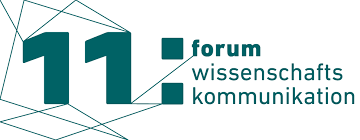After three months at the Institute for Research in Higher Education, it was time to attend my first conference on that subject. Well, not directly on higher ed research, but on science communication, a project I am involved in at the institute.
Thus, for three days in November, the former Germany capital of Bonn had me back as an interested visitor of the 11 Forum on Science Communication. That’s a yearly get-together of roughly 500 people that work in or do research on science communication, ie. the reasons of and ways in which scientists communicate about their doings (mostly research, one might presume) with public audiences.
The conference’s programm promised a mix between hands-on workshops of practical methods as well as reflective formats, but in reality it was mostly a networking event for science communicators. Science communicators mostly seem to be people who left a strictly academic career to start public relations-agencies or work with universities’ press offices to “communicate science.”
What that means differs widely from case to case; for some people, it is the notion of scientific research that needs to be anchored more firmly in social decision-making; for others, it is nurturing the spirit of research in youngster; and, yeah, well, for most it is purely doing PR-stuff. For the latter, universities, researchers and academies are simply another client of their portfolio. I talked with attendants of the meeting who told me with a straight face that lobbying for the pharmaceutical industry is a kind of science communication because the production process of all these pills and remedies involved research at some time … moments like that made me feel a bit dizzy at times.
While most seminars, talks and roundtables were geared towards practical issues (“pivot to video” is all the rage, apparently), a few presented some interesting insights into methods on how to research science communication, into actors and politics and into popular attitudes towards science (and maybe a certain limited understanding of that term, as I tried to point out in a comment at this blog post).
Yet, it was definitively an experience of a certain kind. I am just wondering who designed the logo of this congress: It uncannily reminded me of the 2015 logo of the German Association of Americanists’ summit on knowledge landscapes. Maybe the press office at Bonn University copy-pasted, or these abstract, interweaving layers of geometric forms actually represent knowledge and communication in the best form possible.

